Episodes
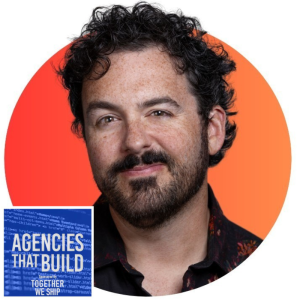
Wednesday Oct 09, 2024
Marketing for the Modern World: Strategies with Evan O'Brien
Wednesday Oct 09, 2024
Wednesday Oct 09, 2024
In this episode, we're joined by Evan O'Brien, founder of Slake Marketing. With over a decade of experience helping startups and small businesses, Evan shares his digital marketing and business development expertise. He discusses creating authentic brand connections, breaking through stagnation, and aligning marketing efforts with business goals. Get ready for valuable insights on standing out in today’s competitive market.Discussion Points:~ Can you debunk a common myth and set the record straight for us? 1:21~ What framework or methodology do you use to assess whether your message is being effectively conveyed and heard across different platforms? 4:17~ Are you seeing a shift across the board in how quickly messaging and creative content are tested compared to traditional methods? 13:10~ What inspired you to start your agency, and what was your thought process behind it? 23:53~ How do you determine if someone is the right person to work with? 35:10~ What currently keeps you up at night? 42:09Show notes:
~ The clearer we can communicate, the more effectively we can serve our clients and help them achieve their vision.~ Every creative journey shapes us; moving from media to web development wasn’t just a career change but an evolution of my approach to problem-solving.~ Creating a tool like a drag-and-drop web editor was about democratizing technology—making it accessible to everyone, regardless of their coding skills.~ Being a Chief Creative Officer wasn’t just about directing creativity; it was about cultivating a culture where every voice matters.~ You can’t pour from an empty cup; prioritizing your well-being isn’t just good for you, it’s essential for your work and your team.~ Not every client is the right fit, and that’s okay. It’s about finding partnerships that inspire growth on both sides.~ A client’s willingness to accept feedback reflects their commitment to growth—collaboration only works when both parties are invested.Myth-busted - More marketing channels equal better results.Links:LinkedIn: www.linkedin.com/in/evanobrien/Company’s Website: slakemarketing.com Show Credits - Host - Varun Bihani & Drew MabryProduced by Juhie BhardwajEdited by Harish Khatarkar
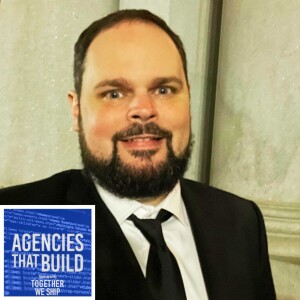
Tuesday Oct 01, 2024
Tuesday Oct 01, 2024
In this episode, we are joined by Devin Concannon, Partner at Golden Digital, a digital marketing master who expertly merges creativity with technology to elevate eCommerce businesses. With over a decade of experience and a background in teaching digital marketing at the General Assembly, he brings invaluable insights to the table. In this conversation, he discusses effective strategies for motivating teams and retaining clients in a competitive market. Discussion Points -~ What’s one common myth you’d like to bust? What’s something you want to set the record straight on? 5:32~ Do you think the "four-hour work week" is a realistic approach to making money? 10:59~ Can you tell us more about how you got started in this? What inspired you to start your own business, and what has kept you going? 15:51~ What are the key lessons you’ve learned transitioning from employee to solo entrepreneur to agency owner? 21:58 ~How do you keep your team inspired and motivated during challenging times, and do you work with offshore teams? 25:23~ What tasks have you found effective to outsource offshore, and which do you prefer to keep in-house? 31:56~ What strategies do you use to maintain client relationships and grow existing accounts in a competitive market? 36:39Show notes -~ Understanding cultural differences is crucial; it allows us to tailor our communication and expectations effectively.~ We leverage technology to bridge gaps, ensuring seamless collaboration regardless of geographical distances.~ Feedback is a two-way street; it’s essential for growth both for the team and the clients we serve.~ Creativity thrives in diverse environments, where different perspectives can challenge the status quo.~ Success in remote teams is about establishing trust and fostering an inclusive culture.~ We prioritize empathy in our design process; it’s fundamental to creating user-centric solutions.~ The goal is not just to complete a project but to build lasting relationships that contribute to shared success.Myth-busted - You can make fast money online with little effort.Links -LinkedIn: https://www.linkedin.com/in/devinconcannon/ Company website: https://www.goldendigital.coShow Credits - Host - Varun Bihani & Drew MabryProduced by Juhie BhardwajEdited by Harish Khatarkar
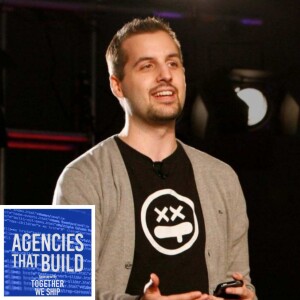
Friday Nov 24, 2023
Friday Nov 24, 2023
In this episode, we're joined by Tyler Sticka, Co-owner, Partner, and Creative Director at Cloud Four. With experience leading teams in both a stealth startup and at WE Communications, Tyler's unique design process, blending hand-drawn sketches and interactive prototypes, sets him apart. In this conversation, he touches on effective consultation strategies, the collaborative learning approach, and the evolving landscape & challenges in web design.
Discussion points -
What sort of bogus myth, strategy, or misconception would you like to set the record straight on? 2:47
How do you build trust with clients while guiding them through a transparent and collaborative process? Are there any specific strategies that have been particularly effective? 8:57
How do you manage collaboration and project success when working with both internal development teams and external partners, especially in the context of remote work? 20:50
How has your consulting work impacted clients' processes? Can you share an example where a customer adopted a concept or practice from your approach, resulting in a positive change? 25:52
How do you maintain the quality of your consultation work, ensuring clients adopt and follow recommended processes? How do you minimize instances where clients deviate from the proposed strategies? 30:28
What led you to take on a leadership role in your career, and how have your interests in art and technology influenced your approach to leadership? 34:10
What's exciting you about the future? 42:48
Show notes -
I feel like it's better to spread that workout, be transparent, and give peeks behind the curtain along the way. Take this as an opportunity to guide the customer, guide your client, and guide your stakeholders through the process so they understand how to participate in it. 4:12
Once you've established relationships, it's all about figuring out a way to harvest those ideas and thoughts through discovery. 11:50
A lot of times, we're hired to be the lubrication that helps the gears move forward, using whatever the latest technology is or bridging a technology gap. 15:36
It's about ensuring a shared understanding and ownership of priorities because inevitably, you'll encounter new information that can alter your initial solution. In a world with finite resources, it then becomes all about prioritization. 21:46
Our strategy is that you can learn a lot not just by having someone teach you, but you'll learn even more by working on problems together. We delve into the real problems, not just the stated ones. The customer gets to understand how these things work, how they function, and how they come together. Not in the abstract, but in a literal sense, they get to learn by doing. 31:32
We're at this interesting turning point with the web, where for the last 10 years, there has been an emphasis on frameworks, with React being by far the most prevalent, but all frameworks have been sort of dominating. 43:17
I'm excited for the opportunity to do the right thing in those regards, to make the best use of these browser capabilities, and to design the best, most accessible experiences I can. And to use these trends to inform and let folks know that we have so much work to do when it comes to the web. 46:11
Myth Busted - Designers work in isolation, creating solutions magically, and revealing a finished product dramatically.Links -
LinkedIn: https://www.linkedin.com/in/tylersticka/
Company website: https://cloudfour.com/ https://tylersticka.com/
Show Credits -
Host - Varun Bihani & Jessie CoanProduced by Bobby SoniEdited by Harish KhatarkarContent by Yashika Neekhra & Juhie Bhardwaj
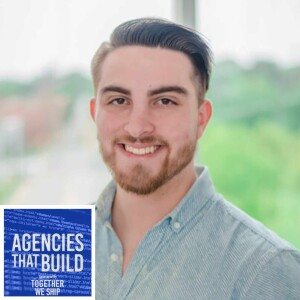
Friday Sep 08, 2023
Friday Sep 08, 2023
In this episode, we are joined by Jeff Gapinski, Partner and President of Huemor, a master of user-centered design and crafting immersive online experiences. Jeff's insights into user behavior and his ability to design websites that resonate with target audiences have contributed to his agency's success in helping businesses achieve remarkable results. In this conversation, he discusses the motivation behind global expansion and strategies for consistently generating leads.
Discussion Points -
What sort of bogus myth, strategy, or misconception would you like to set the record straight on? 1:34
Could you please tell us a little bit about Huemor? What is its origin story? 4:38
How do you and your co-founder split responsibilities and what does the yin and yang dynamic look like between the two of you? 8:10
Was there a specific pivot point or moment when you felt that your business had become legitimate and transformed into a real, thriving enterprise? 9:29
Why did you decide to expand globally? Was it driven by talent, cost, or a mix of factors, and how did you achieve success despite the economic challenges many agencies face today? 12:54
Do you have a dedicated role, like a project manager, who acts as the liaison between your clients and your overseas team? 19:54
How do you address client concerns about billing rates when they're aware of your cost-effective global team and question why they're charged the same rate as an onshore team? 22:39
Where do you find inspiration and information? Any favorite publications, groups, or online communities you rely on for staying informed? 25:14
How do you, as a business owner, ensure a steady stream of leads and collaborate with your partner for business growth? 28:02
What's the biggest mistake you've made in your life and how did you learn from it? 29:52
What's exciting you about the future? 31:25
Show notes -
I didn't initially plan on running this large-scale business. I started with a passion for a creative skill, and over time, that creative skill evolved into a fully-fledged company. 4:53
In terms of personality, I am much more strategic and measured, while he (co-founder) is a lot more high-energy, enjoys connecting with new people, and tends to be more spontaneous in that way. I think this is a significant factor in how we naturally settled into these different roles. 8:59
In 2020, there was one of those moments when many of the learnings and training we had accumulated over approximately eight to nine years in business had to be swiftly put into action to formulate a plan for navigating the challenges that arose in early 2020. 11:11
I reached out directly to other agency owners who had international team members and picked their brains regarding their strategies for acquiring such team members. I also sought out international recruiters and partnered with one, particularly in Eastern Europe, who had been extremely successful for us. This combination of strategies allowed us to start connecting with various team members. 15:04
Understanding how people operate across the group was really important, and it's something we continue to learn today. As we've expanded into more countries, there are more nuances to consider. Another aspect is ensuring these individuals feel fully integrated into the team. Every day, we're implementing new measures to facilitate this. 16:19
We pay significantly above the market rate for all our international team members, resulting in less disparity between our US and international teams in terms of compensation. 23:53
If I were to go back and restructure things, what I would actually do is focus more on bringing in an operator sooner. Essentially, having that operator work with more freelance talent rather than hiring permanent talent. With me as the operator for the business, I think that would have allowed us to scale a lot more effectively. 30:33
This year, we've been implementing EOS, and as we approach year-end, lower-level teams are increasingly engaged in EOS meetings. I'm thrilled by the communication improvements we've achieved through this system. 31:35
Myth-Busted - Having dogs in the office is always amazing and super convenient.
Links - LinkedIn: https://www.linkedin.com/in/jeffrey-gapinski/ Company website: https://huemor.rocks/
Show Credits -Host - Varun Bihani & Jessie CoanProduced by Bobby SoniEdited by Harish KhatarkarContent by Aakash Damani, Yashika Neekhra, and Juhie Bhardwaj
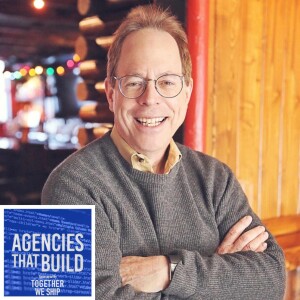
Friday Sep 01, 2023
Friday Sep 01, 2023
In this episode, we are joined by Fred Pike, the Managing Director and GA & GTM Practice Lead at North Woods Digital. He is a seasoned expert in analytics, an accomplished presenter, and a dedicated educator who has crafted numerous online courses for beginners. In this conversation, he discusses practicing Google Tag Manager in his agency and strategies for forecasting business growth challenges.
Discussion Points -
What sort of bogus myth, strategy, or misconception would you like to set the record straight on? 6:32
Could you explain how you initiated and led the Google Tag Manager practice in your agency? What prompted you to establish this practice? 8:22
When exploring courses, should individuals begin with beginner-level Google Analytics (GA) courses, or should they consider other topics? 11:22
How do you position your analytics services in client acquisition? Is it a primary focus or complementary to other offerings? 14:57
How do you tackle forecasting challenges for business growth, particularly in custom software solutions? How accurate is your forecast for the upcoming months? 19:52
How do you handle overstaffing or excess production capacity caused by low client demand? 22:53
How did your agency decide on the practice lead role for Google Analytics and Tag Manager expertise? And how do you effectively market this specialization to clients? 30:21
What percentage of your business's revenue comes from the GA and GTM revenue stream, considering the time it took to develop and expand this practice? 32:40
How do you define your ideal customer? What are you doing to ensure your positioning is strong? 36:30
What is exciting you about the future? 39:11
Show notes -
The more I dove into GA and GTM, the more I realized we should be doing this for our clients. They need to understand what's happening with their website, and they need to be tracking those meaningful user interactions. And so, it just grew into a practice eventually. 10:31
I think you should choose a course that offers an introductory overview of the model used to capture that information. It should also discuss the types of information you should be tracking. 12:41
The way we typically approach a new client is through some form of strategy, aiming to comprehend their website goals and how they're gauging the effectiveness of their strategy. 15:37
I think the thing that's really important that has helped me and the companies I've engaged with over the years is a model of the business. It's not the business model itself; it's a model that encompasses the business's structure. This includes the staff members and the anticipated revenue streams. 16:57
I've never found a great forecasting tool that fits well with professional services businesses like the ones I've been engaged with. You'd expect such a tool to exist, but I've never found one. So, I ended up developing one internally. 18:40
Many times, we win business because we're discussing topics that no one else has ever addressed with that client. And, so that speaks to the level of expertise that we have in that in that realm. 32:01
The way we aim to grow and attract new clients is through thought leadership. We accomplish this through a couple of methods. Firstly, by creating blog posts, where we are actively engaged in writing about various digital marketing strategies and aspects. Secondly, through our webinars, we maintain a robust series of webinars. 37:08
By feeding the right questions, Chat GPT often offers valuable advice, though sometimes not as reliable. I'm thrilled about exploring this area and its potential to boost my efficiency, possibly by 20%, and that just has me jazzed. 40:01
Myth Busted - Anyone can effectively use Google Tag Manager without proper knowledge
Links - LinkedIn: https://www.linkedin.com/in/fredpike/Company website: https://www.nwsdigital.com/ Twitter: https://twitter.com/fred_pike Show Credits - Host - Varun Bihani & Jessie CoanProduced by Bobby Soni Edited by Harish KhatarkarContent by Aakash Damani, Yashika Neekhra, and Juhie Bhardwaj
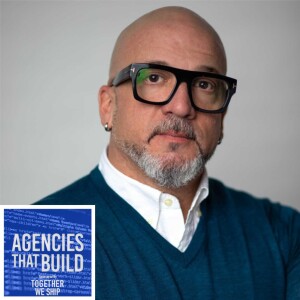
Friday Aug 18, 2023
Friday Aug 18, 2023
In this episode, we're joined by Javier Santana, Co-Founder at Launch, a trailblazing Digital and Creative Services agency. Javier seamlessly merges innovation and experience to drive businesses toward his goals. Alongside his professional pursuits, he contributes to the advisory board of the Atlanta Community Food Bank's Hunger Walk Committee and co-hosts the illuminating webcast, SpeedBumps Live. In this conversation, he imparts wisdom on agency relationship management and impactful cross-level communication.
Discussion Points -
What sort of bogus myth, strategy, or misconception would you like to set the record straight on? 5:19
What strategies or approaches have you found to be effective in genuinely attracting customers and fostering the growth of a successful agency? 6:41
Could you share how your agency is structured? 9:17
How do you personally manage boundaries, both individually and for your team, in client relationships? 12:09
Could you discuss your agency's setup, positioning, customer engagement, and how your processes have evolved over time? 19:45
Can you describe your agency's discovery process after the initial client meeting, including budget, project type, and addressing their specific needs? 26:48
How did you transition to your current positioning? Do you position yourself as a specialist for specific reasons, or as a generalist? How did you navigate this journey? 30:07
What led to your three attempts at running agencies, and why did the current one succeed? 36:29
If you could advise your 20 or 25-year-old self, what would you say? 42:07
What's exciting you about the future? What are you looking forward to? 45:04
Show notes -
The reality is that you have to genuinely be a good client partner when working on projects, whether they're valued at $200 or involve simple tasks. You just need to be someone who is willing to listen and ensure that you provide the proper guidance for your customers or clients. 7:01
During the time when I was managing agency relationships, I learned a valuable lesson: if you don't have something to contribute, avoid coming to the table. 10:16
I don't set up boundaries when it comes to that client's stuff. I will not text my client at six o'clock on a Saturday, but if they text me, I will respond. Not because I feel like a slave to the system, but because this is what I love to do. 12:24
Communicating with different people on different levels and understanding how their choice of communication is extremely important on every level, whether you're talking to an executive or you're talking to a user. 16:41
When working with clients, we function as an extension of their team, not just as a vendor. We ensure that we establish this close partnership, collaborating hand in hand. 21:14
You need to understand who the client is before the conversation even begins. It's about being respectful of their time and understanding their situation. Are they dealing with recent layoffs? What challenges are they aiming to overcome? This way, you could come in with an idea. 27:51
I don't believe in 'fake it till you make it,' not in the sense of pretending we can do anything. Signing a deal and then scrambling to assemble an unfamiliar team, potentially putting the project at risk – that's like wearing a pie on your face after betraying someone's trust with a lie. 31:27
I want to be known as someone whose company consistently delivers the finest work. Our team comprises the most excellent talents and partners, and that's what I strive for. 36:05
Somebody recommended the book 'The E Myth,' the entrepreneurial myth. I bought it, read it, and while flipping through the pages, I thought, yep, made that mistake. Yep, did that too. But with this little book, I could have skipped those mistakes. So, lesson one is to learn from other people's mistakes so you don't make them. 38:51
Focus on the things you're passionate about because those are the areas where you'll excel, driven by your unrelenting obsession with them. 44:25
Myth Busted - "If you build it, they will come” - Just creating something will make customers come to you automatically.
Links - LinkedIn: https://www.linkedin.com/in/javierjsantana/Company website: http://www.launchxd.com/Podcast link - http://speedbumpslive.com/
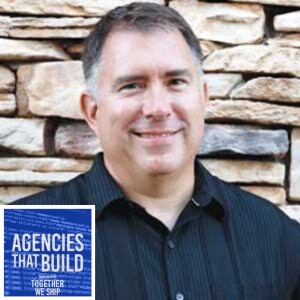
Friday Aug 11, 2023
Friday Aug 11, 2023
In this episode, we're joined by Scott Lock, Co-Founder and CEO of InfernoRed Technology, a visionary leader with a strong tech passion and remarkable innovation track record. With a computer science background, he established InfernoRed, a dynamic and forward-looking company. In this conversation, he discusses maintaining a team-centric approach, value delivery, managing costs with senior talent, and the agency's growth journey.
Discussion point -
What is some sort of myth bogus strategy and misconception? What do you want to set the record straight on? 7:22
How do you address client requests for faster progress while maintaining alignment with your team's capabilities and project objectives? 9:23
How do you establish an internal environment that promotes continuous learning and enthusiasm for personal growth, especially when faced with repetitive projects? 18:00
How do you balance maintaining a team-first approach, delivering value, and managing the costs of senior talent in your agency's growth journey? 21:19
What insights do you have in terms of interviewing and finding that person who you know will be fit for the firm? 29:14
Can you walk us through your project execution process, considering the absence of traditional roles like producers or account managers, and how you manage ownership and point of contact for the entire project with your team? 33:24
How do you, as a business leader, stay inspired and continuously learn to keep yourself updated? Where do you seek learning opportunities? 44:08
Show notes -
Recently, I heard a quote that I was really trying to take to heart: "If you want to move fast, do it alone; if you want to go far, do it with a team." That's he kind of approach that we take when we are working on projects. 8:21
We establish the trust early on, so they (clients) don't feel like we're just attempting a money grab by trying to get as many people, because they understand our consulting approach and how our business model works. This creates a sense of trust, like we're in this together. 10:57
We focus on finding meaningful and interesting work because it's much harder to find highly qualified senior engineers with the same talent and capabilities as our company has. Getting them engaged in something they're passionate about or interested in is incredibly important. 16:23
We have implemented a continuous engagement model using a platform called Fit Team. We've established this over the last few years, where we maintain ongoing engagement with our team as we continue to grow. 19:19
We are not the cheapest consulting company out there, nor the most expensive, compared to larger firms with exorbitant rates. However, we prioritize delivering value. In recent internal discussions, we emphasized that if clients begin to question the team's value, it signifies a breakdown in our approach. 24:41
We conduct these huddles with our team every week as part of the continuous engagement I mentioned. These huddles involve discussing the project and the client in the context of the project with the entire team. 39:25
NBA, that's one of my favorite clients in the entire world when it comes to sports. I'm a huge basketball fan. Even though they're a marquee client and an amazing organization with a huge program that does things the right way, our team loves working there.43:31
Every agency has this opportunity: as you continue to grow an incredible technical team, something will come across your path, and you'll just be able to hook into it. Then, that will be the opportunity for you to grow and learn. 46:25
We have been working for four years with Microsoft, focusing on enhancing election platform technology through the concept of verifiable election results using the open-source product called Election Guard. This initiative, although led by them, has our team inspired, as they feel their work might make a meaningful impact on the world. 50:16
Myth-Busted - Adding more engineering resources to a project will automatically speed up progress.
Links -
LinkedIn: https://www.linkedin.com/in/scottlock/
Twitter: https://twitter.com/scottlock
Company website: https://www.infernored.com/
Show Credits -
Host - Varun Bihani & Jessie Coan
Produced by Bobby Soni
Edited by Priyanka Sharma
Content by Yashika Neekhra and Juhie Bhardwaj
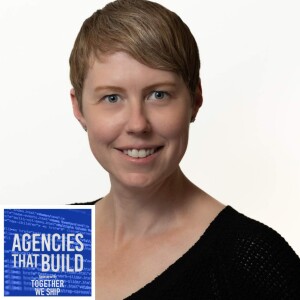
Friday Aug 04, 2023
Friday Aug 04, 2023
In this episode, we are joined by, Khaiersta English, the Founder & Product Design Lead at Flower Press Creative Studio, LLC. With 25 years of expertise in digital product design and engineering, she has crafted apps, websites, and experiences for an impressive clientele, including industry giants like Visa, Adobe, and Nike. From Creative Director to UI/UX Designer and Content Strategist, she is a versatile powerhouse, skilled in early research, prototyping, team management, and client relations. In this conversation, she highlights the value of the "discovery" process in product design and effective upselling strategies for long-term client relationships.
Discussion Points -
What sort of bogus strategy or misconception do you want to set the record straight on? 2:27
How do you effectively communicate the value of the "discovery" process to potential clients? 4:00
How do you decide the price for your services? 7:16
Could you please elaborate on your agency's approach to marketing, particularly in attracting clients by focusing on people rather than companies? 11:28
How do you upsell to existing customers and maintain strong long-term relationships? What strategies and tools do you use to maintain communication with your extensive client base? 14:25
How would you define the difference between a partner and a vendor in the context of business relationships? 17:52
As a partner in client projects, how do you handle differences of opinion while maintaining a productive relationship? Any tips or insights based on your experience? 20:25
As a female founder and advocate for female founders, what tips do you have for women and individuals in underrepresented groups navigating the entrepreneurial landscape? 25:01
As a leader and business owner, where do you spend your time connecting with peers and other business owners? 28:26
What's exciting you about the future? 31:22
Show notes -
We go through a process called discovery. Discovery is a planning phase, where you undertake stakeholder interviews, map out the assistant design, assemble a prototype, and test it with end users to see if the product direction is valid. That is a paid phase of work. 3:11
You'd be surprised how many people tell me that when they go to an agency, the agency just gives them a price based on the specifications they describe. It is refreshing to hear someone willing to help them validate those specifications. 6:58
We work hourly because hourly acknowledges the reality of software, which is that things change and it's impossible to know all the requirements upfront. 7:53
People are sold on the process once they get involved in it, because it's very exciting to hear real feedback, based on a prototype, to see it in action, to interact with it. 8:50
The main thing is building a network, staying in touch, and continuing to reach out to let people know you're around. Launching projects and showcasing successful project launches are good ways to ensure repeat business. 13:31
I find that upselling work is the easiest way to get new work. When you identify needs and offer solutions to those needs, such as identifying and fixing problems, it becomes one of the best ways to ensure a steady stream of ongoing work. 14:04
Partner is someone who's personally invested in the success of the brand and the project to the point where you operate as if you're a business owner, you operate and make decisions and give advice as if it's your company to run. 18:12
The biggest thing to keep in mind is focusing on the work and the outcomes, putting in the time and effort, and not worrying too much about whether you are male or female. It just comes down to doing the best work. 26:14
I think the intuitive sense of what people need and the caregiving sense that women have are instrumental to our roles as caregivers and mothers. Moreover, these qualities translate well to the workplace, particularly when developing tools for humans and creating user-friendly solutions. 27:03
I have business owners whom I collaborate with and deeply value and trust. I proactively reach out to them, setting up conversations specifically for brainstorming, and through these interactions, I've been able to establish mentorship relationships with some of these individuals. 29:32
I am looking forward to growing our team, we're adding a second engineering channel so we can take on more projects. 31:28
Myth-Busted -
Sales professionals or agencies do not get paid for the planning phase of the sales process
Links -LinkedIn: https://www.linkedin.com/in/khaiersta/
Twitter:https://twitter.com/theflowerpress
Instagram: https://instagram.com/khaiersta
Company website: https://www.theflowerpress.net/
Clutch: https://clutch.co/top-service-providers/women-owned
Show Credits -
Host - Varun Bihani & Jessie Coan
Produced by Bobby Soni
Edited by Priyanka Sharma
Content by Aakash Damani, Yashika Neekhra, and Juhie Bhardwaj
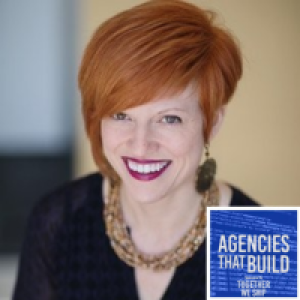
Friday Jul 28, 2023
Friday Jul 28, 2023
In this episode, we are joined by Monica Langin, the President of Visionary. With nearly three decades of work experience, Monica is known for her direct communication and problem-solving skills. Originally from a delightful town in southwest Iowa, she has dedicated 20 years to Visionary, progressing from a project manager to her current role as President. In this conversation, she discussed the importance of building strong client relationships, overcoming challenges during COVID-19, and the process of hiring and evaluating cultural fit during recruitment.
Discussion Points -
What's some sort of bogus strategy, or misconception, do you want to set the record straight on? 1:34
What is the monthly ‘Visionary Day’ that you guys do in the office? 13:25
Tell us more about how you organize and celebrate the epic holiday party at your company. 19:54
How do you set the budget for cultural building activities? 24:39
As you've traveled up the ranks, what challenging moments made you pause and work through them? 25:57
What is that one thing that makes you feel that you're doing something great? 31:29
How do you evaluate the right cultural fit during the hiring process? 32:29
How challenging is it to find the right talent for technical roles in the Midwest, given that coastal regions often attract professionals? What strategies do you use to attract skilled individuals to your company in this region? 37:11
What is exciting you about the future? 41:30
Show notes -
It's (visionary day) is a very important day, from my perspective, because it's a tool that I have leveraged to bring people back together. 13:43
Something that is very visionary about ‘Visionary’ is that when we're together, the things that we share, the personal relationships, obviously, but the knowledge that's shared across the team, just by accident, is impressive and outstanding. 15:56
We set a budget like everybody else's, we have a fiscal year, and we set that budget at the beginning of the year. And we try to stay as close as possible. 25:00
We had one of our best years ever from a sales standpoint, and everything was going great just before the pandemic hit. However, when the pandemic struck, everything slowed down, and we faced a long period of uncertainty. It was a little terrifying to navigate through that. 26:11
The one thing that makes us feel we are doing something great is that anyone, even our youngest, newest employees, can be in a room with other visionaries or customers and have a great idea, the ability to say, "I'm listening to you. I hear your problem. And I have a solution. 31:37
Culture is very important to us. So when we hire people, we try very hard to involve different individuals. It's not always the same people involved in the interview process, but rather those who will be working with or reporting to the candidate. We strive to mix it up so that candidates have the opportunity to interact with different team members and experience the diverse perspectives within our company. 32:55
We already had a remote work policy, but initially, we were not keen on hiring people from outside our region. However, we have now changed our approach and realized the benefits of being open to candidates from anywhere, as long as they are the right fit for the company. 39:29
What I think draws people to us locally is our vibrant company culture. We offer 80% coverage for health benefits, provide bonuses, and host an amazing holiday party. While we work hard, we also know how to have fun. 40:13
I am very excited about the next generation of the Visionary. Thrilled, beyond belief at the leadership team. I couldn't do any of this without the people who work with me daily. 42:07
Myth-Busted - Midwesterners ride cows to the school.
Links -
LinkedIn: https://www.linkedin.com/in/monica-langin-40ab607/
Company website: https://visionary.com/
Instagram: https://www.instagram.com/monicalangin/?hl=en
Show Credits -
Host - Varun Bihani & Jessie Coan
Produced by Bobby Soni
Edited by Priyanka Sharma
Content by Aakash Damani, Yashika Neekhra, and Juhie Bhardwaj
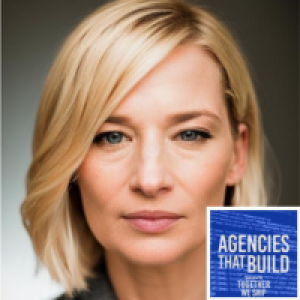
Friday Jul 21, 2023
Friday Jul 21, 2023
In this episode, we are joined by Meg Schlabs, Co-founder & Creative Director at Wizardly, a visionary brand strategist specializing in creative branding and design services. With a background in copywriting and a passion for creativity, Meg crafts captivating brand positioning and design, leaving a lasting impression on clients and their audiences. She values partnership and trust, navigating the challenges and successes of building a business together. In this conversation, she talks about brand positioning, traditional A/B testing, and partnering with family members in a business.
Discussion Points -
What sort of bogus strategy, or misconception do you want to set the record straight on? 4:08
What is the best approach to determining the right brand positioning and logo design when traditional A/B testing is not applicable? 5:07
How did your agency decide to involve creative experts directly in client conversations, and what led to the realization that this approach was more effective than the traditional method of relying solely on account managers or producers? 12:09
Can you share the origin story of Wizardly, including how the company came into existence, and the inspiration behind the name "Wizardly"? 14:45
What are some of the learnings in partnering up with somebody in the family? 21:11
What tools do you use to facilitate project planning, maintain reference points, and ensure smooth communication within your team? 27:43
How did your agency identify the need to pivot towards the biotech niche, and what strategies did you employ to successfully transition your services while ensuring continued revenue generation? 33:53
How did you identify the need to support startup target audiences and position your agency as a valuable partner? And, how do you determine the pricing structure? 37:23
Where do you spend your time researching and learning about this industry? How do you keep yourself up-to-date? 41:44
What are your pain points? What is something that keeps you up at night? 43:55
What is exciting you about the future? 46:01
Show notes -
We use a combination of research on the target audience and brand positioning. And I believe that every business is scaling into something at any given moment. 5:44
We do a ton of competitor analysis, and target audience research. And, based on the research, we identify brand differentiators' value propositions. 8:35
The first strategy session is all about digesting, and the second one is about presenting. The third one is focused on defining and hammering out the details, allowing us to walk away from this meeting, knowing what we're going to create. 9:15
There's no perfect answer, and it's better to move forward, we're going to see more progress moving forward, than if we're standing, still debating which way to go. 10:45
You learn something about yourself when you observe how your business interacts with its market. 11:07
There needs to be more connection between the person that's driving this project, the one who knows the company, and the person going off to write copy for the web project. 13:34
The beauty of parenting is that they're just passing through your fingers; you only have a few moments in time to be a part of their life. Similarly, with employees, we have limited time to be a part of their work journey and cultivate them as humans while pushing them toward their goals. 32:49
We start with a deck, which helps to solidify our clients' messaging. This way, they can better understand their own identity and develop an elevator pitch to confidently present themselves when walking into a room. 36:45.
Building a company and taking care of your people, doing good work they're those threads that run through every business. So, I find the most inspiration from my friends who are building companies and are in the same stage of building. 42:57
I'm excited about design subscriptions and seeing where this leads for Wizardly. We have intentionally not been a retainer-based company because we feel like retainers can sometimes be unfair to both parties. So, it takes a lot more effort to restart the scope with clients and manage cash flow. But we have a new product - design subscriptions - that we're rolling out in an effort to provide really solid design services. 46:11
Myth Busted - There is a perfect logo or brand position for companies.
Links -
LinkedIn: https://www.linkedin.com/in/meg-schlabs-7a7714b1/
Twitter: https://twitter.com/megschlabs
Instagram: https://www.instagram.com/megaustinschlabs/
Company website: https://wizardly.co/
Show Credits -
Host - Varun Bihani & Jessie Coan
Produced by Bobby Soni
Edited by Priyanka Sharma
Content by Aakash Damani, Yashika Neekhra, and Juhie Bhardwaj






